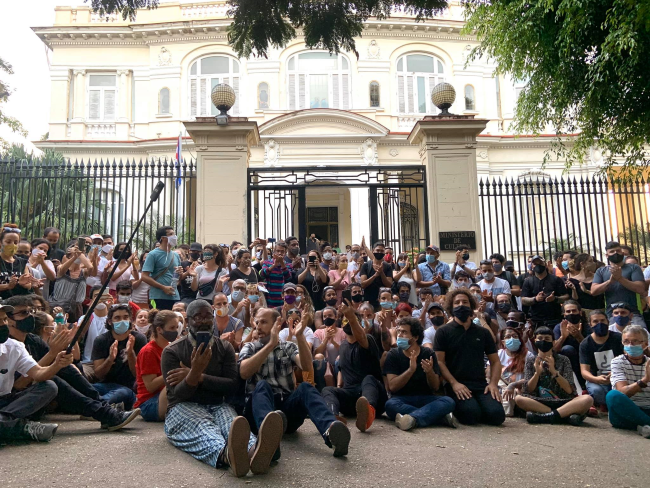
On November 27, 2020, a group of Cuban artists and intellectuals staged a peaceful demonstration in front of the Ministry of Culture in Havana.
Photograph by Reynier Leyva Novo | MoMA Magazine
Call for Applications, 2024–25
Convocatoria de solicitudes, 2024–25
Application deadline: March 15, 2024
The Mellon Foundation has awarded a $750,000 grant to FIU's Cuban Research Institute to establish a three-year fellowship program for threatened Cuban scholars in the humanities. The program will help artists, writers, scholars, and journalists from the island to continue their work in safety abroad. The program will substantially broaden and deepen current discussions about intellectual freedom—including freedom of thought and expression—in Cuba, the United States, and worldwide.
"We're very grateful to the Mellon Foundation for supporting the first comprehensive program for threatened Cuban scholars in the United States at FIU," said Dr. Jorge Duany, director of the Cuban Research Institute. "This program will provide a temporary institutional base for artists, writers, journalists, and humanities scholars who face severe threats on the island because their work has challenged the status quo. These threats include the risk of persecution, incarceration, or banishment due to the scholar's ideas, public interventions, or participation in peaceful demonstrations."
The Fellowship Program for Threatened Cuban Scholars in the Humanities at FIU will:
- Provide temporary academic refuge for scholars facing serious threats to their lives, liberty, and well-being in Cuba.
- Offer vital financial and administrative support for threatened Cuban scholars so that they can continue their work in safety.
- Strengthen teaching, research, and public programming in the humanities on Cuba in the United States.
- Expand the demographic composition of U.S. university faculties to include more scholars of Latin American origin, specifically from Cuba.
- Partner with other Hispanic-serving educational institutions in the United States to support threatened scholars from Latin America and the Caribbean.
The fellowship program, to last a maximum of one semester (four months) per scholar, will furnish a stipend and travel expenses. The program will also cover relocation expenses for each scholar and their families. A total of twelve resident fellowships will be awarded during the three-year duration of the program (January 2023–June 2026). By limiting the fellowship to one semester per scholar, the program will reach a large number of persons as well as cover a broad range of disciplines, such as literature, art, music, and journalism.
The program will have three main components:
- Research, writing, and creative work. The program will provide participants the time, material resources, and administrative support to conduct their own projects, whether academic or cultural in nature, such as archival research or musical performances. Each fellow will submit a proposal to pursue their scholarly, artistic, or cultural work while in residence at the Cuban Research Institute.
- Participating in the scholarly and cultural life of the host institution (Florida International University). Fellows will be invited to give public lectures, attend panel discussions and conferences, and organize art exhibitions, concerts, and film screenings, among other activities. All of these events will be free and open to the general public. Fellows are expected to keep regular office hours during their tenure at FIU.
- Networking with other educational institutions, through travel, research, and lecturing, especially in other members of the Crossing Latinidades Humanities Research Initiative, supported by the Mellon Foundation, particularly the University of Illinois, Chicago (UIC), and the City University of New York (CUNY). Each of the selected scholars will travel once during their stay at the Cuban Research Institute to one of these partner institutions outside Miami.
To apply for the program, please download the call for applications at the top of this note and send all required documents to cri@fiu.edu.
Previous Awardees
- Carolina Barrero, art historian currently living in Spain, "Chronicles of the Year of the Protests: Testimonies of Cuban Resistance" (journalistic book project about the events of 2021 in Cuba), fall 2024
- Katherine Bisquet, poet currently living in Spain, "The White Memory" (book of interviews with Cuban artists and writers), spring 2024
- Dr. Marialina García Ramos, anthropologist currently living in Mexico, "The Arts of Good Governance: Contestation, Body, and Power in a Strand of Cuban Art and Articivism (2003–2016)," spring 2024
- Dr. Celia Irina González, visual artist and anthropologist currently living in Mexico, "Mutating before the Total Caribbean" (ethnographic book project about the artistic practices of Cuban artists who have recently moved to Miami), spring 2025
- Camila Lobón, visual artist currently living in the U.S., "The Way of the Virgin" (graphic novel about a Cuban woman who migrated from Chile to the U.S. in 2021), fall 2024
- Omara Ruiz Urquiola, art historian curently living in the U.S., "Academic Freedom and Cultural Rights: The Cuban Case" (archival research project), spring 2024
- Yoe Suárez, journalist currently living in the U.S., "Christian Ethics vs. Totalitarianism in Cuba" (bibliographic research project), spring 2025
- Lía Villares, artist currently living in the U.S., "Free Art vs. Totalitarian Censorship" (documentary series), fall 2024